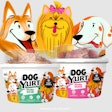It's not uncommon for media and others to see certain marketing terms and trends with petfood -- such as humanization -- and interpret them literally. Yet recently, BloombergBusinessweek took the concept to a whole new level.
Writer Teddy Wayne, who describes him- or herself as a "foodie," decided to taste seven petfoods with label claims of "human grade." (Actually, the headline of the article calls the petfoods "gourmet," an even vaguer term.)
When I first saw the article, I thought it had to be tongue in cheek, a parody, even if BloombergBusinessweek is usually considered a serious publication. But Wayne writes about the topic straight up and seems to have undertaken this taste test as a genuine quest, even consulting a wine expert on which wines paired best with the different petfood products. The mind boggles ...
First of all, I realize that for people outside our industry (and even for some of us within it), it's difficult to understand many label claims used on petfoods and whether they are regulated. But Wayne is clearly misinformed, writing that petfood with the human grade claim "meets the Association of American Feed Control Officials' ingredient and manufacturing requirements."
Well, not necessarily. According to the AAFCO "Business of Pet Food" website, the terms "human grade" and "human quality" have no legal definition -- meaning AAFCO has no requirements regarding them. The organization does warn against false and misleading claims and, on the Labeling and Label Requirements page of the site, spells out how that might apply specifically to human grade or human quality claims (scroll to the bottom of the page). But such claims on petfood labels definitely do not mean the products have met requirements related to those claims.
Perhaps Wayne's misunderstanding of the claim is the motivation for conducting the taste test. That seems to have been compounded by another misunderstanding, alluded to in the article with a reference to how the Honest Kitchen -- a petfood manufacturer characterized by Wayne as the "biggest petfood company permitted to claim human-grade status" (there's that incorrect terminology again, "permitted") -- has all its employees taste every ingredient while developing new formulations. The problem is, there's a huge difference between tasting individual ingredients (such as chicken, vegetables and the like) and tasting a finished product that is intended to appeal to a dog or cat, not a human.
And therein lies the real problem with Wayne's mindset and that of others: anthropomorphizing pets. I believe most people's humanization of their pets -- treating them much the same as human family members -- has, for the most part, been positive for pets. (Admittedly, it's also been good for our industry and the overall pet care industry.) But anthropomorphism, ascribing human characteristics to animals, can be a dangerous path to follow.
There's nothing inherently wrong with anyone sampling petfood, whether or not it's labeled human grade. I know people (adults!) who have tasted their pets' meals just out of curiosity. The Honest Kitchen even offered a dog food Taster Kit for consumers last year. It's actually a great way for a petfood company to prove to consumers that their products are safe.
But I'm still mystified that anyone would seriously think "human grade" on a petfood label means that product might taste good to humans -- and taste even better paired with the proper wine!
For the record, Wayne really liked Nature Variety's SweetSpots (with a Riesling, naturally).


















